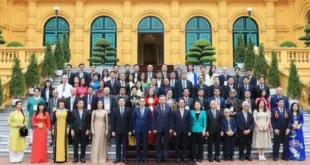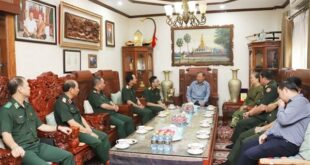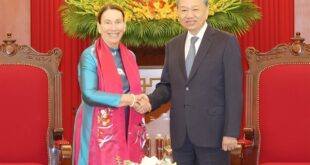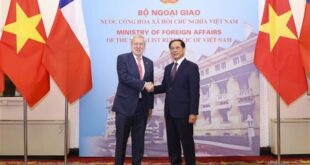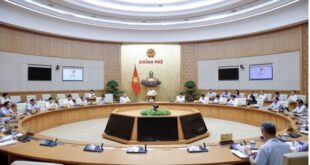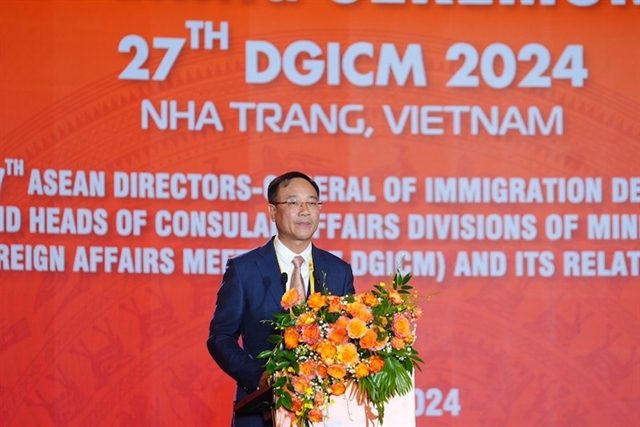 |
| Lieutenant General Phạm Thế Tùng, Deputy Minister of Public Security of Việt Nam, speaks at the meeting. — Photo cand.com.vn |
KHÁNH HÒA — The 27th ASEAN Directors-General of Immigration Departments and Heads of Consular Affairs Divisions of Ministries of Foreign Affairs Meeting (DGICM 27) officially commenced on Hòn Tre Island, Nha Trang, Khánh Hòa Province on Wednesday.
The conference, themed ‘Comprehensive Security, Strengthening Connectivity, and Moving Towards the Future’ marks the ever closer cooperation among ASEAN countries in general and the respective immigration and consular management agencies. This collaboration reflects a shared commitment to building a united, strong, and prosperous ASEAN community.
The DGICM Conference was first held in 1996 and has since followed an annual rotational hosting mechanism. It serves as a forum for ASEAN countries to discuss shared concerns and exchange experiences in immigration and consular management.
The conference also introduces initiatives, measures and mechanisms to enhance immigration cooperation within and beyond the bloc, contributing to facilitating travel for citizens and combating illegal immigration.
Việt Nam has been a member of the DGICM since 1997. The country has successfully hosted the conference twice, in Hà Nội in 2003 and Hồ Chí Minh City in 2013, receiving positive feedback from ASEAN and its key partners beyond the bloc.
In his opening remarks, Lieutenant General Phạm Thế Tùng, Deputy Minister of Public Security of Việt Nam, emphasised that over the years, Việt Nam has closely coordinated with ASEAN countries, particularly Australia, a significant partner outside the bloc, in the fight against illegal migration. Currently, Việt Nam issues e-visas to citizens of all countries and territories, regardless of the purpose of entry, without requiring sponsorship from individuals or organisations and permits stays of up to 90 days.
The country has completed the e-passport project and implemented automatic immigration control at international airport checkpoints. Việt Nam and ASEAN countries have effectively implemented visa exemption agreements for citizens holding ordinary, official and diplomatic passports. Travel within the bloc is relatively convenient, yet there is still much to be done to enable unrestricted movement for ASEAN citizens.
In 2024, Việt Nam is honoured to host the 27th Conference, an event marking the increasingly close cooperation between immigration and consular management agencies within the ASEAN region. “This is an opportunity for Việt Nam, as the host country, to demonstrate our proactive and responsible approach as a member of the Conference, contributing to building a united, strong, and sustainable ASEAN in immigration and consular management,” Deputy Minister Tùng said.
Tùng said since its founding 57 years ago, ASEAN has continually developed, becoming a driving force in regional and global progress. ASEAN’s relations with the world have expanded and diversified, making it the world’s fifth-largest economy. It can be affirmed that ASEAN has proven its status and resilience in the new era, emerging as a global beacon of security and economic growth.
However, ASEAN is currently facing numerous significant security challenges arising from the rapidly changing and unpredictable geopolitical environment and globalisation, including transnational crime, high-tech crime exploiting the relaxed immigration environment for criminal activities and global non-traditional security issues.
Therefore, ensuring comprehensive security is a central task for ASEAN’s sustainable development, requiring a shift in thinking and a new, globally-oriented, holistic approach that benefits all citizens in the long term. ASEAN member states must unite, cooperate and maintain unity in diversity, upholding ASEAN’s independence, self-reliance and strategic autonomy. Reaffirming a strong commitment to and determination towards a more connected ASEAN is key to unlocking the region’s full potential and enhancing its overall competitiveness.
With these significant roles and meanings, this year’s 27th DGICM Conference has a focus on addressing challenges in immigration and consular management, building a resilient ASEAN home that can weather any circumstance and effectively implementing the fundamental principles and common orientations agreed upon by ASEAN, realising the ‘ASEAN Community Vision 2045’.
Deputy Minister Tùng noted that the Conference in Việt Nam will continue to review and assess the implementation of initiatives from the 26th DGICM Conference held in Thailand in 2023, aiming to unify measures and cooperation mechanisms in immigration and consular management within the ASEAN bloc. This includes mechanisms for information exchange, capacity-building cooperation for immigration management personnel and developing projects and programmes for immigration cooperation within ASEAN and with partners outside ASEAN.
Over three days, the Conference will conduct six important meetings and forums, discussing issues such as managing major checkpoints within ASEAN, mechanisms and measures for exchanging immigration information within the bloc, trends and challenges of illegal migration in the region, and sharing experiences in immigration and consular management. Additionally, the Conference will include bilateral meetings on the sidelines and cultural exchange programmes to strengthen friendly relations and cooperation between ASEAN member states and partners outside ASEAN.
“Việt Nam, as the host country, is committed to providing the best possible conditions for the success of the 27th DGICM Conference. We hope that through the meetings and discussions, delegates will have the opportunity to exchange valuable experiences and propose initiatives to promote regional cooperation, facilitating ASEAN citizens’ travel and combating illegal immigration activities,” Tùng said.
Conference content
The 27th DGICM Conference is an official meeting where the Director of the host country’s Immigration Management Department will be elected as the meeting’s Chairman. Each member state will deliver speeches and national reports, including updates on the situation, experience sharing, and proposals for new measures in immigration and consular management. The progress and direction of implementing DGICM cooperation initiatives and mechanisms will also be discussed.
In addition, the 7th ASEAN Main Checkpoint Heads Forum (AMICF 7) will discuss and exchange experiences in managing major checkpoints within ASEAN and propose measures to enhance checkpoint management efficiency. The 19th ASEAN Immigration Information Exchange Forum (AIIF 19) will discuss mechanisms and measures for exchanging immigration information within ASEAN, update the contact points for information exchange in each country, and review the implementation of the Action Plan for the Immigration Data Sharing Protocol (IDSP).
The third Meeting of Heads of Units Against Illegal Migration (HSU 3) will discuss trends and challenges of illegal migration in the region and efforts to address this issue effectively.
The 19th DGICM-Australia Consultation Meeting will evaluate and discuss the cooperation programme between the two sides to enhance the capacity of immigration officers and discuss the ASEAN-Australia Work Programme on August 15. The third DGICM +3 Consultation Meeting (China, Japan, Korea) will exchange experiences in immigration and consular management and identify areas of cooperation between ASEAN and the +3 countries on August 15. VNS
- Reduce Hair Loss with PURA D’OR Gold Label Shampoo
- Castor Oil Has Made a “Huge” Difference With Hair and Brow Growth
- Excessive hair loss in men: Signs of illness that cannot be subjective
- Dịch Vụ SEO Website ở Los Angeles, CA: đưa trang web doanh nghiệp bạn lên top Google
- Nails Salon Sierra Madre
 VnExpress News The News Gateway of Vietnam
VnExpress News The News Gateway of Vietnam
